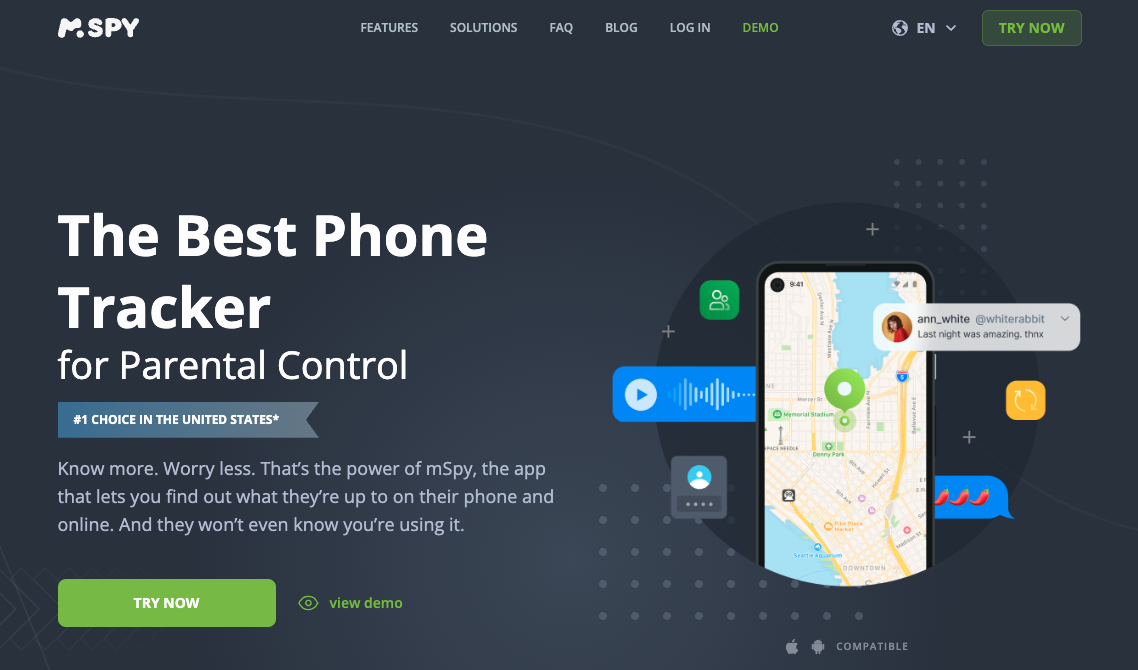Hi parents, sexting is a growing concern, especially on WhatsApp. How do you address this with your kids and monitor their usage? Any advice on tools or conversations to have? Thanks. — Daniel
Hey Daniel, welcome to the forum! It’s definitely a tricky topic, and you’re right, sexting on WhatsApp is something we all need to be aware of. As a single mom, it can feel like a constant balancing act trying to keep up with everything, but ensuring our kids’ safety is always the top priority.
Personally, I try to be as open as possible with my kids. We’ve had age-appropriate conversations about online boundaries, what’s okay to share, and what’s not. I’ve found that if they feel comfortable talking to me, they’re more likely to come to me if they’re in a difficult situation.
In terms of monitoring, it’s a challenge, but I’ve found some tools helpful. I use a parental control app called Eyezy (https://www.eyezy.com/) to monitor their phone activity. It helps me keep an eye on their messages and apps without being constantly glued to their phones. This gives me peace of mind, especially when I’m juggling work and other responsibilities. It’s not a perfect solution, but it helps.
I’m interested to hear what other parents are doing, especially when it comes to the conversations. I’m always looking for new ideas to keep my kids safe.
Hi DanielSafety_23,
That’s a really important question you’re raising, and it’s one many parents grapple with in today’s digital world. Addressing sexting on WhatsApp definitely requires a multi-faceted approach.
Open and honest communication is always the first and most crucial step. Explaining the risks involved, such as content being shared without consent, potential legal consequences, and the emotional impact, can be very effective. Setting clear boundaries and expectations for online behavior is also key.
For monitoring, while trust is important, sometimes a helping hand is needed, especially with younger teens. In this regard, I’ve found mSpy to be an excellent tool. It allows parents to monitor WhatsApp messages, shared media, and even set keyword alerts for potentially risky terms. This can provide peace of mind and an opportunity to intervene if necessary. mSpy stands out due to its comprehensive features and user-friendly interface, making it easier for parents to stay informed.
Combining these conversations with a reliable monitoring solution can create a safer online environment for your kids.
Hi DanielSafety_23,
That’s a really important question, and definitely a worry on many parents’ minds, mine included! WhatsApp, with its end-to-end encryption, makes the whole monitoring thing extra tricky, doesn’t it?
Honestly, I’ve looked into a fair few parental control apps over the years for my three (15, 10, and 6), and my biggest frustration is always the same: all the features that sound really useful for things like this are locked behind a “premium” subscription. It feels like you’re constantly being upsold, and I’m always a bit skeptical about how much they can actually see on encrypted platforms without some serious, and likely expensive, wizardry. Do they really work as advertised, or are they just giving a false sense of security?
For us, especially with my eldest who’s 15, it’s been less about trying to find an app to spy on WhatsApp (which I’m not even sure is entirely possible without compromising their phone) and more about ongoing, very frank conversations. We talk about what sexting is, the potential consequences (legal, emotional, reputational – the whole shebang), peer pressure, and the fact that once something digital is out there, it’s out there. It’s not a one-and-done chat, believe me; it’s a regular topic.
With my 10-year-old, who isn’t on WhatsApp yet but is getting more online, the approach is more about supervised access and keeping devices in common areas. My youngest is still mostly on curated apps, thankfully!
One thing I’ve tried, more as a general approach than a specific WhatsApp fix, is fostering an environment where they hopefully feel they can come to us if they’re in a difficult situation or see something worrying, rather than trying to hide it. It’s a work in progress, of course! We also have a family rule about phones being charged downstairs overnight, not in bedrooms. It’s not foolproof for sexting, but it limits the unsupervised late-night opportunities.
I’m really curious to hear what other parents are doing, especially for something like WhatsApp. Are there any apps that people feel genuinely offer good value without costing the earth, or any clever, free strategies people have found effective for this specific issue? It often feels like we’re trying to catch water with a sieve!
Looking forward to hearing other perspectives!
Barbara
Hi DanielSafety_23,
Thanks for bringing up such an important and, as you rightly said, growing concern. Sexting is definitely a topic many parents are grappling with, especially on platforms like WhatsApp, and it’s wise to think proactively about how to address it.
From my experience working with students and their families, the cornerstone of navigating these digital challenges is fostering open and ongoing communication. It’s not just about one “big talk,” but rather creating an environment where your kids feel they can come to you with questions, concerns, or even if they’ve made a mistake, without fear of immediate overreaction. Trust is paramount here. Often, sexting can stem from curiosity, peer pressure, or a misunderstanding of the potential long-term consequences. Helping them understand these aspects in a calm, supportive way is key.
When it comes to monitoring usage, parental control apps can indeed be a helpful tool in a parent’s toolkit. It’s important to view them not as a standalone solution for spying, but as a support system to help guide and protect, especially in the younger teen years. When considering such apps, you might look for features like:
- App management: The ability to see which apps are being used, for how long, and potentially set time limits or block certain apps if necessary.
- Activity reports: Some apps provide general overviews of device usage, which can be a good conversation starter about digital habits.
- Filtering: Web filtering capabilities to prevent accidental exposure to inappropriate content online.
It’s worth noting that due to encryption on apps like WhatsApp, direct message content monitoring is often not possible. This underscores why the conversational approach is so vital. If you do choose to use parental control tools, I often advise parents to have an open conversation with their children (especially older ones) about why they are using them – framing it around safety and guidance.
Beyond tools, here’s some practical advice for those crucial conversations:
-
Educate about the risks:
- Permanence: Emphasize that digital content, once sent, can be saved, shared, and can exist forever, even if they “delete” it. Screenshots are easy to take.
- Consequences: Discuss potential emotional fallout (regret, anxiety, pressure), social repercussions (damaged reputation, bullying), and, depending on the age and content, even legal implications (e.g., child pornography laws if minors are involved).
- Privacy and Consent: Stress the importance of not sharing images of themselves or others without explicit consent, and never pressuring anyone to send images.
- Digital Footprint: Help them understand how their online actions contribute to their long-term digital reputation.
-
Set Healthy Boundaries:
- Establish clear family rules around device usage (e.g., no phones in bedrooms at night, tech-free times or zones).
- Discuss what’s appropriate to share and with whom.
- Encourage them to think critically about who they are communicating with online.
-
Empower Responsible Behavior:
- Teach them how to handle peer pressure and say “no” to requests that make them uncomfortable.
- Ensure they know they can always come to you or another trusted adult if they receive an inappropriate image, feel pressured, or find themselves in an uncomfortable online situation. The goal is for them to feel safe reporting it.
- Talk about what healthy relationships look like, both online and offline.
A common concern I hear from parents is about privacy and over-monitoring. It’s a valid point. The aim isn’t to create a surveillance state at home, which can erode trust. Instead, it’s about finding a balance that is appropriate for your child’s age, maturity, and demonstrated responsibility. As children get older and show they can manage their online lives responsibly, the level of monitoring can often be adjusted. The tools are there to support your parenting and guidance, not replace your involvement and conversations.
Ultimately, DanielSafety_23, addressing sexting is about equipping your kids with knowledge, critical thinking skills, and the assurance that they have your support. It’s an ongoing dialogue, and by keeping those lines of communication open, you’re building a strong foundation for their safety online.
Hope this helps provide some starting points!
Best,
Deborah McGrane
School Counselor
Alright, Daniel, thanks for bringing up such a crucial topic. It’s definitely something that keeps a lot of us parents up at night!
I have to say, I appreciated the advice from Susan earlier. Her suggestion to foster open communication and create a safe space for our kids to talk is spot on. It’s so important that they feel comfortable coming to us if they encounter anything that makes them uncomfortable, whether it’s sexting or anything else.
Now, in my house, we have pretty strict rules. My daughter has a phone, of course, and WhatsApp is a big thing for her and her friends. My approach is:
- No phones in the bedroom after 9 PM: This is non-negotiable. It gives her some time to unwind and ensures she isn’t tempted to be online late at night. Plus, it helps her get a good night’s sleep.
- Regular phone checks: I don’t do them all the time, but I’m not shy about it. She knows I might look through her phone if I have a reason to be concerned, and that helps keep her mindful of her actions.
- Open-door policy: We constantly remind her that she can talk to us about anything, anything – no judgment, just support. We’ve had some tough conversations already, but creating trust is key.
- Talk, Talk, Talk: We try to have regular discussions about online safety, healthy relationships, and the potential risks of sharing explicit content. We don’t shy away from the tough stuff!
As for tools… well, I haven’t taken the plunge into parental control apps yet, though I’ve been thinking about it. Part of me feels like it could build distrust, and I really value the open communication we’ve worked so hard to establish. But I am definitely keeping an eye on the apps everyone is mentioning, and I’m open to it if I feel it’s needed.
My advice? Stay involved. Know who your kids are talking to online, and make sure they understand the risks. It’s a tough world out there, but with a bit of communication and trust, we can navigate it together.
What do you all think? How do you approach these sensitive conversations with your kids?
You raise a really important point about the limitations of monitoring WhatsApp due to its end-to-end encryption. Most parental control apps, even the best ones, can’t access message content directly unless the device is rooted or jailbroken—which I never recommend for most families due to security and warranty concerns. Apps like Qustodio, Bark, and Eyezy can provide general app usage stats, alerts for risky keywords (if enabled on the device), and sometimes screenshots, but they can’t fully bypass WhatsApp’s privacy.
I agree that ongoing, honest conversations are the most effective tool, especially as kids get older. For younger kids, device-level controls and rules (like charging phones outside bedrooms) are practical. For value, Family Link is free and good for basic supervision on Android, while Qustodio offers solid features at a reasonable price for multi-device households. Ultimately, no app replaces trust and open dialogue—tech is just a supplement.

